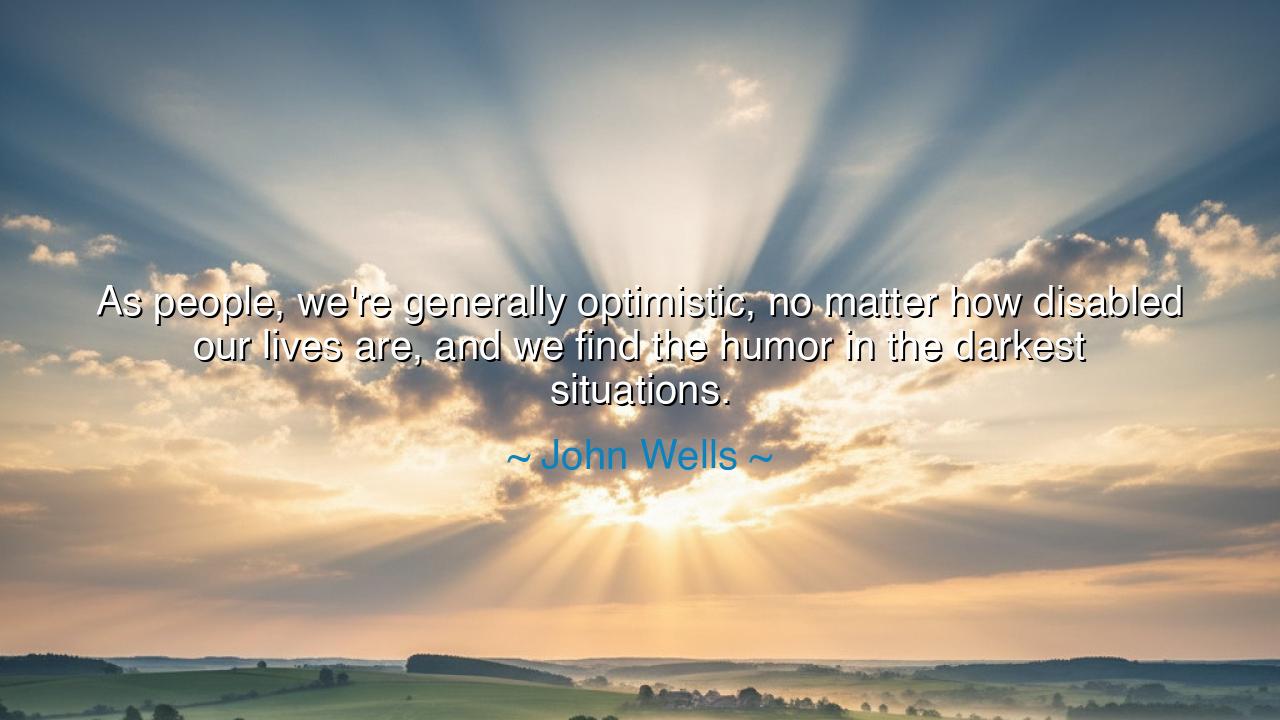
As people, we're generally optimistic, no matter how disabled our
As people, we're generally optimistic, no matter how disabled our lives are, and we find the humor in the darkest situations.






When John Wells said, “As people, we're generally optimistic, no matter how disabled our lives are, and we find the humor in the darkest situations,” he was not merely speaking of optimism or laughter. He was speaking of the indomitable nature of the human spirit—that mysterious force that refuses to be extinguished even when surrounded by sorrow. His words are both an observation and a reverence, a recognition that within every human heart burns a quiet fire: the will to survive, to hope, and to smile even when the world seems to crumble around us. Wells understood that humor, far from being trivial, is one of humanity’s most sacred defenses—a light that refuses to bow before the shadow of despair.
The origin of this reflection lies in Wells’s long experience as a writer and storyteller, particularly through his work in television dramas such as ER, The West Wing, and Shameless. Through his characters, he has witnessed and written of the human condition—its triumphs, its tragedies, its absurdities. He has seen the sick joke that life sometimes plays upon us, and yet, he has also seen how people laugh anyway. In hospitals, in war zones, in homes filled with debt or loss, he found that people cling to optimism not because they are blind, but because they are wise. They know that laughter cannot erase pain, but it can carry them through it. His words arise from this truth: that even in brokenness, humanity possesses a strange grace—the grace of laughter.
To be optimistic, as Wells uses the word, is not to live in denial. It is not the shallow cheerfulness of those who have never suffered. It is the deep, defiant choice to believe in tomorrow when today has nothing left to offer. It is the choice to see beauty through the cracks, to stand and keep breathing even when there seems to be no reason to. And humor—ah, humor is the twin of optimism, the laughter that bubbles up from the same sacred spring. The two walk hand in hand. One sustains the mind, the other heals the soul. Those who can laugh through their pain are not weak; they are among the strongest of all, for they have mastered the art of turning agony into courage.
Consider the story of Anne Frank, who, hidden in the shadows of fear and persecution, still wrote with the heart of an optimist. In her diary, amid terror and confinement, she found humor in the small absurdities of daily life. “I don’t think of all the misery,” she wrote, “but of the beauty that still remains.” That sentence, like Wells’s quote, reveals the same eternal law: that hope and humor are not born in comfort, but in suffering. Even surrounded by darkness, she found a way to smile—and in doing so, she became eternal. For laughter, when born from pain, is not mockery—it is resistance. It is the soul saying, You cannot take everything from me.
History, too, is filled with the laughter of the broken who refused to be broken. In the trenches of the First World War, soldiers told jokes between bomb blasts; in the concentration camps, prisoners whispered puns to one another in the face of death. Even in the ancient world, the philosophers of hardship—like Epictetus, a slave who became one of the greatest Stoics—found humor in the absurdity of human suffering. “Man is disturbed not by events,” he said, “but by the view he takes of them.” To find humor, even in tragedy, is to take back power. It is to rise above the cruelty of circumstance, and to declare that though our bodies may be bound, our spirits remain free.
Wells’s insight is not merely a description of human behavior—it is a call to resilience. He urges us to remember that optimism is not a privilege, but a choice. It is not given; it is cultivated. To find humor in darkness requires humility, imagination, and love—for oneself and for others. It means choosing to see that every hardship carries within it a lesson, that even failure has its irony, that laughter itself is a form of grace. When we laugh at our hardships, we do not diminish them; we rise above them. We transform pain into something human, something that connects us rather than isolates us.
So, my children of sorrow and strength, let this be your teaching: do not fear the darkness—bring your laughter into it. When despair comes, meet it with a smile; when pain mocks you, mock it back. Laugh not because life is easy, but because it is difficult, and you are still standing. Seek humor not as escape, but as a reminder of your freedom. Remember that to laugh is to breathe when the air feels heavy, to see light where the world sees only shadow.
For this is the eternal wisdom behind John Wells’s words: “We find the humor in the darkest situations.” It is not a weakness—it is the highest form of courage. The universe itself laughs in the face of tragedy; the stars burn even as they die. You, too, are made of that same immortal light. Let your laughter be your rebellion, your hope, your prayer. And in every dark moment of life, when despair whispers that all is lost, answer it with a smile—and you will find, as countless generations before you have found, that laughter is the sound of the soul refusing to surrender.






AAdministratorAdministrator
Welcome, honored guests. Please leave a comment, we will respond soon